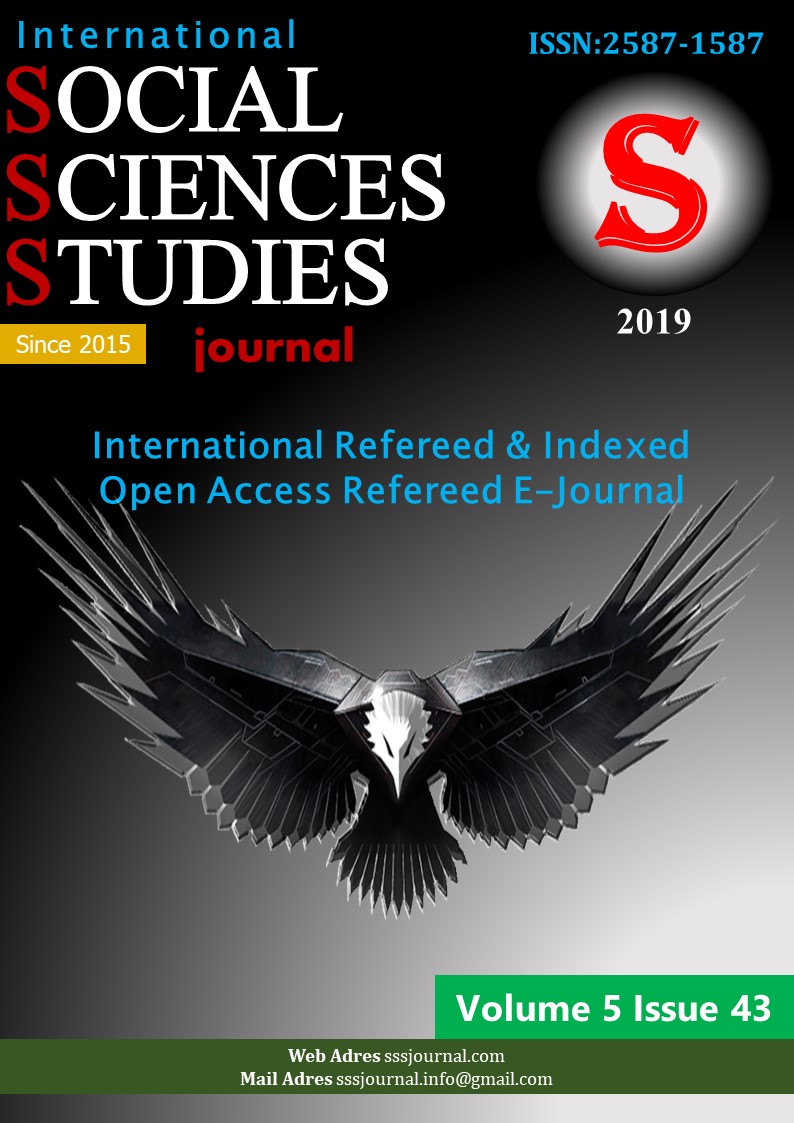Author :
Abstract
Eğitim öğretim sürecinde son yıllarda öne çıkan en önemli konulardan birisi de öğretmen niteliğidir. Hiç şüphesiz öğretmenlerin yetişmiş olduğu ortam ve almış olduğu eğitim biçimi öğretmenlik niteliğini de etkilemektedir. Nitelikli öğretmenin sahip olması gereken özelliklerle ilgili birçok soru ve cevap bulunmaktadır. Genel anlamda bakıldığında her öğretmenin niteliği birbirinden farklıdır. Bu çalışmanın amacı beden eğitimi öğretmeni adaylarının gözünden öğretmen nitelikleri ile ilgili görüşlerinin ortaya konulmasıdır. Araştırmada veri toplama aracı olarak araştırmacı tarafından geliştirilen açık uçlu sorular 2016-2017 eğitim öğretim yılında dört farklı üniversitede öğrenim görmekte olan 40 beden eğitimi öğretmeni adayına sunulmuştur. Araştırmada nitel araştırma yöntemlerinden olan mülakat yöntemi kullanılarak elde edilen veriler, içerik analizi yöntemi ile çözümlenmiştir. Araştırma sonucunda öğretmenlerin sahip olması gereken nitelikler bakımından; iletişim becerisine sahip olması, öğrenciyi ve mesleğini sevmesi, iyi bir rehber olma ve öğrenciye yol gösterici olma özelliklerinin ön plana çıktığı görülmüştür. Sonuç olarak araştırma grubu nitelikli bir öğretmenin mesleğinde yetenekli olma, işini ve öğrencilerini sevme, onlara örnek olma ve öğrenciyi sahiplenme niteliklerinin ön plana çıktığı görülmüştür.
Keywords
Abstract
One of the most important issues that have emerged in recent years in the education process is the characteristic of the teacher. Undoubtedly, the environment in which teachers are raised and the way in which they are taught also influence the quality of teaching. There are many questions and answers about the qualifications that a qualified teacher should have. In general terms, the quality of each teacher is different. The purpose of this study is to reveal the views of teacher candidates about physical education teacher qualifications. The open-ended questions developed by the researcher as a means of collecting data in the research were presented to 40 physical education teacher candidates who were studying at four different universities in the academic year 2016-2017. The data obtained using the interview method, which is one of the qualitative research methods in the research, has been analyzed by content analysis method. In terms of qualifications teachers should have as a result of the research; being a good guide and being a student guide have been the forefront. As a result, it has been seen that the qualification of a qualified teacher of the research group is to be talented in the profession, to love his / her work and students, to be an example to them, and to possess student ownership.
Keywords
- Aksu, M. (1987). ODTÜ Teacher Training Program and a Study on Graduated Teachers. Education And Science,11, 17-26.
- Al-Houli, A.E. (1999). Teachers’ Perceptions Of Parentel İnvolvement in Elementary Schools in The State of Kuwait. Dissertation Abstracts International, 60(05), 1509 A.
- Büyüközturk, S. (2006). Data Analysis for Social Sciences. Ankara: Pegem A Publications.
- Çelikten, M. and Can, N. (2003). Ideal Teacher from the Perspective of Manager, Teacher and Parent. Selçuk University, Faculty of Education Journal. (15), 253-267.
- EARGED, (2008). Determination of In-Service Training Needs of Turkish Teachers who work in Primary Schools, Ministry of National Education Education Research and Development Department Publications, Ankara.
- Ergün, M., ve Duman, T., (1998). Teacher Behaviors in Critical Situations. National Education, 137, 45-58.
- Gay, L., Mills, G., Airasian, P. (2006). Educational Research: Competencies for Analysis and Application. New York: Prentice Hall.
- Gültekin M., Çubukçu Z. (2008). İlköğretim Öğretmenlerinin Hizmet İçi Eğitime İlişkin Görüşleri, Sosyal Bilimler Dergisi, (19)185-2001.
- Karagözoğlu, G. (2003). Eğitim Sistemimizde Öğretmen Yetiştirme Politikamıza Genel Bir Bakış. Çağdaş Eğitim Sistemlerinde Öğretmen Yetiştirme Sempozyumu. C.Ü. Kültür Merkezi, Sivas.
- Korur, F., ve Eryılmaz, A. (2004). Fizik Öğretmenlerinin Niteliklerinin Lise Seviyesindeki Öğrencilerin Fizik Başarısına Etkileri Üzerine Bir Araştırma, VI. Ulusal Fen Bilimleri ve Matematik Eğitimi Kongresi-Özetler, p.149, Marmara Üniversitesi, İstanbul, Türkiye.
- Mc Garity, J.R., Butts, D.P. (1984). The Relationship Among Teacher Classroom Management Behavior, Student Engagement, And Student Achievement Of Middle And High School Science Students Of Varying Aptitude. Journel Of Research In Science Teaching, 21,55-61.
- MEB, ÖYGM. (2010). Öğretmen Yeterlikleri. MEB Yayını. Ankara.
- Oktar, İ. ve Yazçayır. N. (2008). Öğrencilere Göre Etkili Öğretmen Özellikleri. Milli Eğitim Dergisi. (180). s, 8-23.
- Özden, Y. (1999). Eğitimde Dönüşüm Eğitimde Yeni Değerler. Ankara: Pegem A Yayınları.
- Resmi Gazete., (1973). Milli Eğitim Temel Kanunu. No: 1739, Sayı: 14574, Tarih: 24.6.1973.
- Şanal, M. ve Güçlü, M. (2005). Yenileşme Dönemi Eğitimcilerinin Öğretmenlik Mesleğine Bakışları. Sosyal Bilimler Enstitüsü Dergisi. (18), s, 137-154.
- Şeker, H., Deniz, S., Görgen, İ. (2004). İdeal Öğretmen Üzerine Bir Araştırma. Milli Eğitim Dergisi. (164).
- Taşkaya, S.M. (2012). Nitelikli Bir Öğretmende Bulunması Gereken Özelliklerin Öğretmen Adaylarının
- Görüşlerine Göre İncelenmesi. Erciyes Üniversitesi Sosyal Bilimler Enstitüsü Dergisi Sayı: 33 Yıl:2012/2
- Ubuz, B. ve Sarı, S. (2009). Sınıf Öğretmeni Adaylarının İyi Öğretmen Olma ile İlgili Görüşleri. Ondokuz Mayıs Üniversitesi Eğitim Fakültesi Dergisi. (28), s, 53-61.
- Ün Açıkgöz, K. (2003). Etkili Öğrenme ve Öğretme. (5. Baskı). Eğitim Dünyası Yayınları. İzmir.
- Varış, F. (1998). Eğitim Bilimine Giriş. Alkım Yayınları, Ankara.
- Yeşilyurt, E. (2009). “Milli Eğitim Dergisi”,Yıl:38, Sayı:183, 170.
- Yıldırım, A.,& Şimşek, H. (2006). Qualitative Research Methods in Social Sciences. Ankara: Seckin Publications.
- Yılman, M. (2006). Türkiye’de Öğretmen Eğitiminin Temelleri. Ankara: Nobel Yayın Dağıtım.
- Yin, R.K. (1984). Case study research: Design and methods. In Yıldırım, A.,& Şimşek, H. (2006). Qualitative Research Methods in Social Sciences, Ankara: Seckin Publications.
- Yörük, D. ve Tezcan, H. (2009). Öğrenci Görüşlerine Göre Etkili Öğretmenin Özellikleri. Milli Eğitim





